八级英译汉假期作业
- 格式:doc
- 大小:38.50 KB
- 文档页数:5
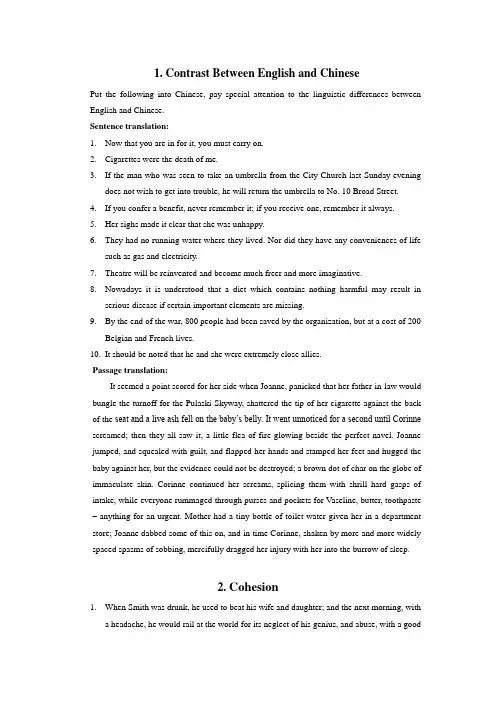
1. Contrast Between English and ChinesePut the following into Chinese, pay special attention to the linguistic differences between English and Chinese.Sentence translation:1.Now that you are in for it, you must carry on.2.Cigarettes were the death of me.3.If the man who was seen to take an umbrella from the City Church last Sunday eveningdoes not wish to get into trouble, he will return the umbrella to No. 10 Broad Street.4.If you confer a benefit, never remember it; if you receive one, remember it always.5.Her sighs made it clear that she was unhappy.6.They had no running water where they lived. Nor did they have any conveniences of lifesuch as gas and electricity.7.Theatre will be reinvented and become much freer and more imaginative.8.Nowadays it is understood that a diet which contains nothing harmful may result inserious disease if certain important elements are missing.9.By the end of the war, 800 people had been saved by the organization, but at a cost of 200Belgian and French lives.10.It should be noted that he and she were extremely close allies.Passage translation:It seemed a point scored for her side when Joanne, panicked that her father-in-law would bungle the turnoff for the Pulaski Skyway, shattered the tip of her cigarette against the back of the seat and a live ash fell on the baby‟s belly. It went unnoticed for a second until Corinne screamed; then they all saw it, a little flea of fire glowing beside the perfect navel. Joanne jumped, and squealed with guilt, and flapped her hands and stamped her feet and hugged the baby against her, but the evidence could not be destroyed; a brown dot of char on the globe of immaculate skin. Corinne continued her screams, splicing them with shrill hard gasps of intake, while everyone rummaged through purses and pockets for Vaseline, butter, toothpaste – anything for an urgent. Mother had a tiny bottle of toilet water given her in a department store; Joanne dabbed some of this on, and in time Corinne, shaken by more and more widely spaced spasms of sobbing, mercifully dragged her injury with her into the burrow of sleep.2. Cohesion1.When Smith was drunk, he used to beat his wife and daughter; and the next morning, witha headache, he would rail at the world for its neglect of his genius, and abuse, with a gooddeal of cleverness, and sometimes with perfect reason, the fools, his brother painters.2.(When one individual inflicts bodily injury upon another, such injury that death results,we call the deed man-slaughter; when the assailant knew in advance that the injury would be fatal, we call his deed murder.) But when society places hundreds of proletarians in such a position that they inevitably meet a too early and an unnatural death, one which is quite as much a death by violence as that by the sword or bullet; when it deprives thousands of the necessaries of life, places them under conditions in which they cannot live – forces them, through the strong arm of the law, to remain in such conditions until that death ensues which is the inevitable consequence –knows that these thousands of victims must perish, and yet permits these conditions to remain, its deed is murder just as surely as the deed of the single individual; disguised, malicious murder, murder against which none can defend himself, which does not seem what it is, because no man sees the murderer, because the death of the victim seems a natural one, since the offence is more one of omission than that of commission. (But murder it remains.)3 Coherence1.In that infinitesimal fraction of time, inconceivable and immeasurable, during which thefirst atomic bomb converted a small part of its matter into the greatest burst of energy released on earth up to that time, Prometheus had broken his bonds and brought a new fire down to earth, a fire three million times more powerful than the original fire he snatched from the gods for the benefit of man some five hundred thousand years ago. 2.The chess board is the world, the pieces are the phenomena of the universe, the rules ofthe game are what we call the laws of nature. The player on the other side is hidden from us. We know that his play is always fair, just and patient. But we also know, to our cost, that he never overlooks a mistake, or makes the smallest allowance for ignorance.3.British newspapers –all of them some of the time, and some of them all the time –behave badly in two ways. They intrude unnecessarily and often hurtfully into people‟s privacy; and they publish inaccurate, sometimes made-up stories. The victims have little redress. If they are rich and the article is defamatory, they can sue for libel. Most cannot afford to do so, and even the rich cannot prevent an invasion of their privacy. Fierce competition, particularly between tabloid newspapers, leads to more feet in more doors.Translation of Idioms, Proverbs and SlangPlease translate the following passages:One afternoon I heard Imelda and her daughter arguing in the kitchen. Her daughter had quarreled with her husband‟s parents, and Imelda was insisting that she apologize to them.Her daughter o bjected. “But, Mama, I just can‟t swallow them, not even with honey. They talk so big until we need something; then they‟re too poor. So today when they wouldn‟t even lend enough to pay for a new bed, all I did was say something that I‟ve heard you say a h undred times: …If so grand, why so poor? If so poor, why so grand?‟”“Impertinent!” snorted Imelda. “Have I not also taught you, …what the tongue says, the neck pays for‟? I will not have it said that I could never teach my daughter proper respect for her elders. And before you go to beg their pardon, change those trousers for a dress. You know how your mother-in-law feels about pants on a woman. She always says, …what was hatched a hen must not try to be a rooster!‟”Her daughter made one more try. “But Mama, you often say, …If the saint is annoyed, don‟t pray to him until he gets over it.‟ Can‟t I leave it for tomorrow?”“No, no and no! Remember: …If the dose is nasty, swallow it fast.‟ You know, my child, you did wrong. But, …A gift is the key to open the door closed against you.‟ I have a cake in the oven that I was making for the Senora‟s dinner. I will explain to the senora. Now, dear, hurry home and make yourself pretty in your pink dress. By the time you get back, I will have the cake ready for you to take to your mother-in-law. She will be so pleased that she may make your father-in-law pay for the bed. Remember: …One hand washes the other, but together they wash the face.‟”。
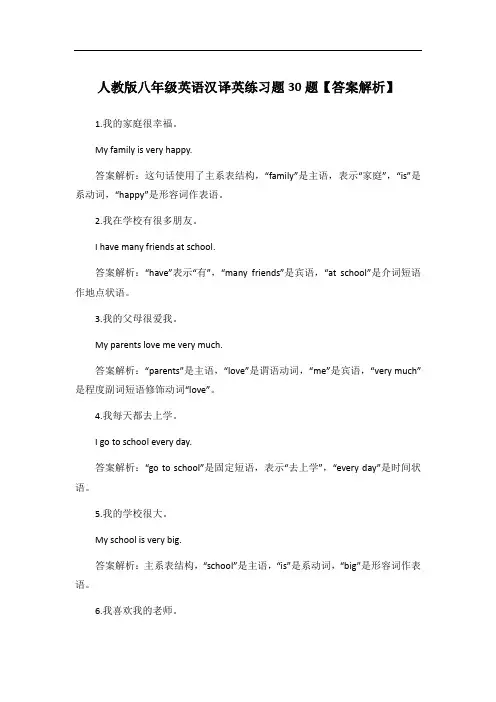
人教版八年级英语汉译英练习题30题【答案解析】1.我的家庭很幸福。
My family is very happy.答案解析:这句话使用了主系表结构,“family”是主语,表示“家庭”,“is”是系动词,“happy”是形容词作表语。
2.我在学校有很多朋友。
I have many friends at school.答案解析:“have”表示“有”,“many friends”是宾语,“at school”是介词短语作地点状语。
3.我的父母很爱我。
My parents love me very much.答案解析:“parents”是主语,“love”是谓语动词,“me”是宾语,“very much”是程度副词短语修饰动词“love”。
4.我每天都去上学。
I go to school every day.答案解析:“go to school”是固定短语,表示“去上学”,“every day”是时间状语。
5.我的学校很大。
My school is very big.答案解析:主系表结构,“school”是主语,“is”是系动词,“big”是形容词作表语。
6.我喜欢我的老师。
I like my teacher.答案解析:“like”表示“喜欢”,“my teacher”是宾语。
7.我在学校学习很多科目。
I study many subjects at school.答案解析:“study”是谓语动词,“many subjects”是宾语,“at school”是地点状语。
8.我的教室很干净。
My classroom is very clean.答案解析:主系表结构,“classroom”是主语,“is”是系动词,“clean”是形容词作表语。
9.我有一个漂亮的书包。
I have a beautiful schoolbag.答案解析:“have”表示“有”,“a beautiful schoolbag”是宾语。
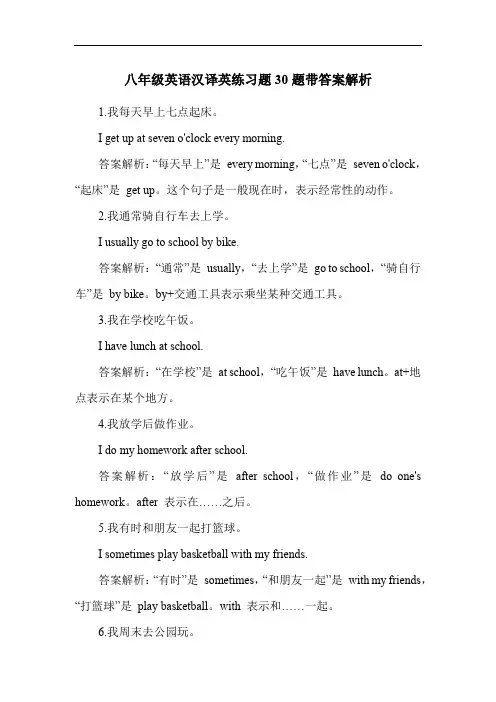
八年级英语汉译英练习题30题带答案解析1.我每天早上七点起床。
I get up at seven o'clock every morning.答案解析:“每天早上”是every morning,“七点”是seven o'clock,“起床”是get up。
这个句子是一般现在时,表示经常性的动作。
2.我通常骑自行车去上学。
I usually go to school by bike.答案解析:“通常”是usually,“去上学”是go to school,“骑自行车”是by bike。
by+交通工具表示乘坐某种交通工具。
3.我在学校吃午饭。
I have lunch at school.答案解析:“在学校”是at school,“吃午饭”是have lunch。
at+地点表示在某个地方。
4.我放学后做作业。
I do my homework after school.答案解析:“放学后”是after school,“做作业”是do one's homework。
after 表示在……之后。
5.我有时和朋友一起打篮球。
I sometimes play basketball with my friends.答案解析:“有时”是sometimes,“和朋友一起”是with my friends,“打篮球”是play basketball。
with 表示和……一起。
6.我周末去公园玩。
I go to the park to play on weekends.答案解析:“周末”是on weekends,“去公园玩”是go to the park to play。
to play 是不定式表目的。
7.我喜欢看电影。
I like watching movies.答案解析:“喜欢做某事”是like doing sth,“看电影”是watch movies。
8.我每天晚上十点睡觉。
I go to bed at ten o'clock every night.答案解析:“每天晚上”是every night,“十点”是ten o'clock,“睡觉”是go to bed。
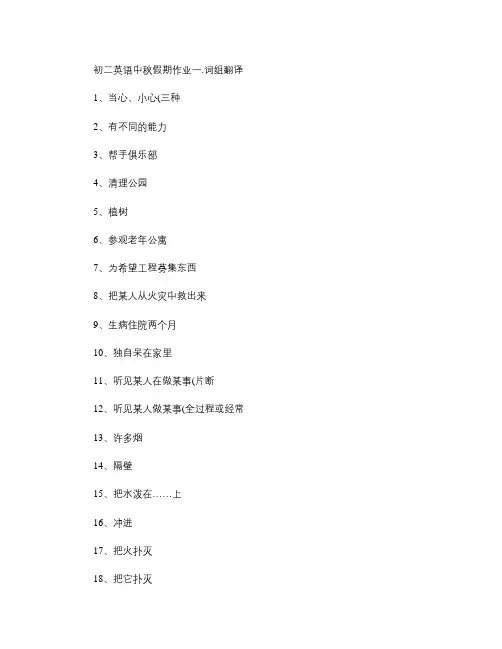
初二英语中秋假期作业一.词组翻译1、当心、小心(三种2、有不同的能力3、帮手俱乐部4、清理公园5、植树6、参观老年公寓7、为希望工程募集东西8、把某人从火灾中救出来9、生病住院两个月10、独自呆在家里11、听见某人在做某事(片断12、听见某人做某事(全过程或经常13、许多烟14、隔壁15、把水泼在……上16、冲进17、把火扑灭18、把它扑灭19、伤着了腿20、处于危险中21、着火22、大声呼救23、很高兴做某事24、互相帮助25、互相学习26、感激某人某事感激某人做某事27、推荐某人得奖28、划船29、钢琴弹得好30、班级活动组织得好31、得奖32、刻苦训练33、记性好34、经常多读英语35、点燃火柴36、尽力做某事37、在……方面取得好成绩38、进入校队39、当心火柴。
40、长头发远离火。
41、不要让炉子一直开着。
.42、不要把热东西放进垃圾箱。
43、去滑雪44、教某人(如何做某事.45、跳得高/跳高46、在过去47、某人发生某事48、先人后己49、没问题。
50、对……非常了解(两种51、一个五岁的男孩(两种52、一个八岁的女孩(两种53、迷路(两种54、做电脑工作55、从网上获取信息56、学新东西快57、做水上运动58、举行一次戏剧表演59、能、会做某事60、做更多的练习61、做更多的运动62、需要更多的训练63、写一封推荐信64、一整天65、有空66、期盼着做某事67、你所说的话68、不要紧,没关系。
69、跑出去70、在公共汽车上给某人让座71、救某人的命72、考虑周到73、听起来危险74、给某人发奖75、收到某人的来信(三种II.根据意思完成下列句子:1.Don’t p_________ the soup over your clothes.2.My hobby is to c___________ stamps.3.Many v________ visit the museum every year.4.I was very happy because I r__________ a letter from my best friend .5.I was reading a book at home. S___________ the telephone rang.6.I remember all the new words. I have a very good m_______ . .7.What h________ to him yesterday? He fell into the water.8.It is d_____________ to play with fire.9.I f __________ to bring our tennis rackets, so we couldn’t play tennis.10.Tom is the head of my class. So he often o___________ different activities for my classmates at school.III.单项选择:( 1.There was a fire last night, but the firemen _______ soon.A. put down itB. put it downC. put out itD. put it out( 2.Wood catches fire easily. So ______fire.A. keep it away fromB. don’t keep it away fromC. keep it awayD. don’t keep it away( 3.Daniel is helpful, and he always________.A. thinks of himself firstB. thinks of others firstC. thinks himself firstD. thinks others first( 4.Listen! I heard Tom________ in the next room.A. singB. singsC. sangD. singing( 5.--May I cross the road, Mom? --______. The traffic light is red now.A. No, you mustn’tB. No, I can’tC. Yes, you doD. Yes, you may( 6.--Can you post these postcards for us on your way home? --________.A. FineB. No problemC. It’s all rightD.I hope( 7.A car hit her yesterday and she is now______. Let’s _______her this afternoon.A. in the hospital, go and to seeB. in hospital, go seeingC. in hospital, go and seeD. in the hospital, to go and to see( 8.What? Walking on the ice? That sounds_______ .A. dangerB. wellC. dangerousD. dangerously( 9.His sister didn’t know the time because she ______ her watch at home.A. leaveB. leftC. forgetD. forgot( 10.He is looking forward to _______ with you soon.A. chatB. chattedC. chatsD. chatting( 11.On ______ home, Susan found a robber getting out of a van yesterday.A. her way toB. her way forC. her way atD. her way( 12.She is good at Chinese but sometimes she is _______.A. carefulB. braveC. carelessD. polite( 13.There are some ________ between the two pictures.A. different B .differents C. difference D. differences( 14.---_______ will you come back? ---Within half an hour.A. How muchB. How longC. How soonD. How often( 15.---_______ did he stay with him? ---For five minutes.A. How muchB. How longC. How soonD. How oftenIV. 用所给词的适当形式填空1. Look out! The house ____________. (burn2. Is Sandy good at ( sing English songs?3 Children must learn how ____________(look after themselves.4 Thank you for (join us?5 He said he ______(may come yesterday.6. I met the important man after (wait for a moment.7 The teacher told us the earth _______ around the sun. (go8. I ___________ (catch a big fish yesterday.9. Where is my book? Oh, I ___________ (forgetto bring here.10. Hurry! Your mother _____________ (wait for you at the school gate.11. Don’t you think it very useful ______________ (learn English well?12. The boy is looking forward to _______________(hear from her.13. The _______________(visit from the home for the elderly are visiting Qing Lake at the moment14. He always worked _______________(care in the past, but now he does well in his work.15. Younger students always have good _______________(memory, they can remember things quickly.V. 完成句子:1. Daniel很有可能会得一等奖。
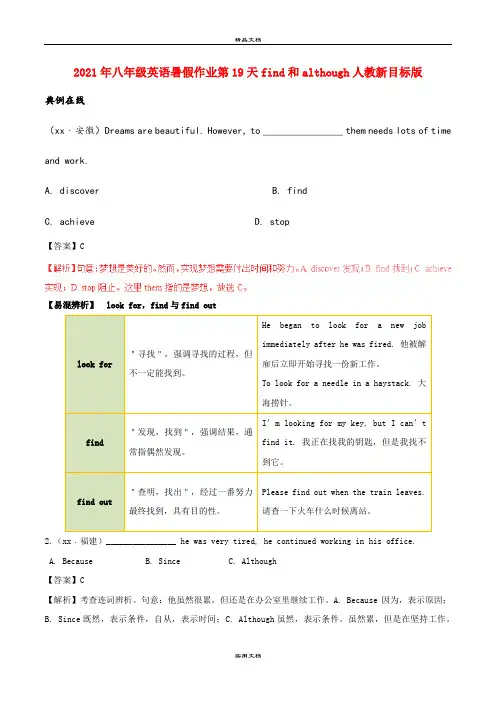
2021年八年级英语暑假作业第19天find和although人教新目标版典例在线(xx﹒安徽)Dreams are beautiful. However, to ________________ them needs lots of time and work.A. discoverB. findC. achieveD. stop【答案】C【易混辨析】 look for,find与find outlook for"寻找",强调寻找的过程,但不一定能找到。
He began to look for a new jobimmediately after he was fired. 他被解雇后立即开始寻找一份新工作。
To look for a needle in a haystack. 大海捞针。
find"发现,找到",强调结果,通常指偶然发现。
I’m looking for my key, but I can’tfind it. 我正在找我的钥匙,但是我找不到它。
find out"查明,找出",经过一番努力最终找到,具有目的性。
Please find out when the train leaves.请查一下火车什么时候离站。
2.(xx﹒福建)________________ he was very tired, he continued working in his office.A. BecauseB. SinceC. Although【答案】C【解析】考查连词辨析。
句意:他虽然很累,但还是在办公室里继续工作。
A. Because因为,表示原因;B. Since既然,表示条件,自从,表示时间;C. Although虽然,表示条件。
虽然累,但是在坚持工作。
故选C。
【归纳拓展】试题推荐1. Try to sing some English songs, you’ll find it interesting ________________ a foreign language.A. learningB. learnsC. learnD. to learn2. He’s ________________ his purse, but he can’t ________________ it.A. looks for;findB. finding;look forC. looking for;findD. is looking;find3. I find it ________________ that I can’t speak English well.A. frustrateB. frustratingC. frustratedD. to frustrate4. I find ________________ impossible to learn a foreign language well in a short time.A. thisB. thatC. it5. ________________ it is raining, ________________ he is still working outside.A. Although;butB. Although;/C. But;althoughD. /;although6. ________________ it was very cold, ________________ my friend still went swimming in JialingRiver this morning.A. Although;/B. Although;butC. But;although参考答案1. D 【解析】本题考查"find + it + adj. + to do sth."的用法。
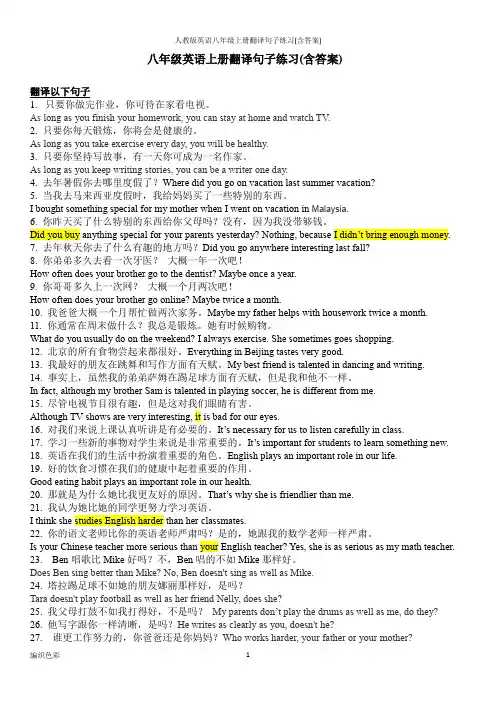
八年级英语上册翻译句子练习(含答案)翻译以下句子1.只要你做完作业,你可待在家看电视。
As long as you finish your homework, you can stay at home and watch TV.2. 只要你每天锻炼,你将会是健康的。
As long as you take exercise every day, you will be healthy.3. 只要你坚持写故事,有一天你可成为一名作家。
As long as you keep writing stories, you can be a writer one day.4. 去年暑假你去哪里度假了?Where did you go on vacation last summer vacation?5. 当我去马来西亚度假时,我给妈妈买了一些特别的东西。
I bought something special for my mother when I went on vacation in Malaysia.6. 你昨天买了什么特别的东西给你父母吗?没有,因为我没带够钱。
Did you buy anything special for your parents yesterday? Nothing, because I didn’t bring enough money.7. 去年秋天你去了什么有趣的地方吗?Did you go anywhere interesting last fall?8. 你弟弟多久去看一次牙医?大概一年一次吧!How often does your brother go to the dentist? Maybe once a year.9. 你哥哥多久上一次网?大概一个月两次吧!How often does your brother go online? Maybe twice a month.10. 我爸爸大概一个月帮忙做两次家务。
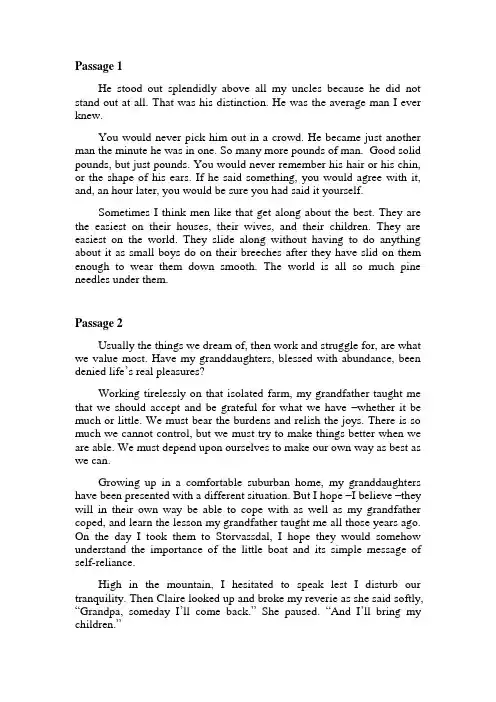
He stood out splendidly above all my uncles because he did not stand out at all. That was his distinction. He was the average man I everknew.You would never pick him out in a crowd. He became just another man the minute he was in one. So many more pounds of man. Good solid pounds, but just pounds. You would never remember his hair or his chin,or the shape of his ears. If he said something, you would agree with it, and, an hour later, you would be sure you had said it yourself.Sometimes I think men like that get along about the best. They arethe easiest on their houses, their wives, and their children. They are easiest on the world. They slide along without having to do anythingabout it as small boys do on their breeches after they have slid on them enough to wear them down smooth. The world is all so much pineneedles under them.Passage 2Usually the things we dream of, then work and struggle for, are what we value most. Have my granddaughters, blessed with abundance, beendenied life’s real pleasures?Working tirelessly on that isolated farm, my grandfather taught me that we should accept and be grateful for what we have –whether it bemuch or little. We must bear the burdens and relish the joys. There is so much we cannot control, but we must try to make things better when we are able. We must depend upon ourselves to make our own way as best aswe can.Growing up in a comfortable suburban home, my granddaughters have been presented with a different situation. But I hope –I believe –theywill in their own way be able to cope with as well as my grandfather coped, and learn the lesson my grandfather taught me all those years ago.On the day I took them to Storvassdal, I hope they would somehow understand the importance of the little boat and its simple message ofself-reliance.High in the mountain, I hesitated to speak lest I disturb ourtranquility. Then Claire looked up and broke my reverie as she said softly, ―Grandpa, someday I’ll come back.‖She paused. ―And I’ll bring mychildren.‖Pete Sampras started playing tennis young and makes no plans to stop anytime soon. The man who has a calm demeanor, boyish shyness and the looks of a star proves again and again what so many players, critics and fans can’t deny: he can win, and always does. In 1990, when Sampras was only 19 years old and seeded twelfth in the U.S. Open, he slammed his way into the finals and became the youngest man to win the tournament. And we all knew after that first Grand Slam victory there would be no looking back.Over the years, the quiet giant has gone on to win eleven more Grand Slams: six Wimbledons, three more U.S. Opens, and two Australian Opens. Sampras’s most beloved titles have come on the grasses of the All England Lawn Tennis and Croquet Club. In 1993, he won his first Wimbledon title, and since that year, has gotten to and won in every final, except for a quarterfinal defeat by in 1996. He is the winningest man at Wimbledon in the Open Era and is one championship away from tying the all time record of seven titles that was set in the late 1800s. The historic grounds of Wimbledon and the intimate Center Court has become a home for Sampras, a ―cathedra‖ as he once said. He will undoubtedly go down in the history books as the greatest.Passage 4The ocean covers three quarters of the earth’s surface, produces 90 percent of all its life-supporting oxygen, and is the driving force behind the entire weather system. There are over 450 million cubic miles of sea water on the earth; and each cubic mile contains over 150 million tons of minerals.So vast and so pervasive is the sea that if the earth’s crust were made level, ocean water would form a blanket over 8,000 feet deep.The oceans contribute immeasurably to the earth’s life support system as well as provide an untapped storehouse of food, minerals, energy, and archaeological treasure.Advanced atmospheric diving suits permit researchers to descend to depths of 1,500 feet. Yet the ocean’s average depth is greater than 12,000 feet. It is at these depths that remarkable discoveries are being made, discoveries which only a short time ago would have been impossible.In that depth, where darkness is absolute and pressure exceeds eight tons per square inch, robotic submersibles have discovered enormous gorges, four times deeper than the Grand Canyon. Here, too, are volcanoes that vastly outnumber those on land. Landslides the size of Rhode Island have been recorded, as well as raging undersea storms that go completely unnoticed on the surface while dramatically rearranging the underwater landscapes.Passage 5It is a curious fact that nine people out of ten become happier when faced with some small misfortune. On my first visit to America, thirty-five years ago, a train in which I was travelling became stuck in a snowdrift so that we did not arrive in New York until a great many hours after all the food on the train had been eaten up. I was beginning to expect that the passengers would draw lots as to who should be eaten, but, far from that, everybody was in the best spirits. People who would have hated each other in ordinary circumstances found each other quite agreeable, and everybody reached an obviously exceptional level of happiness.I observed the same thing in a really bad London fog. An ordinary fog is a mere nuisance, but a fog so bad that you cannot see your own feet brings consolation even to the most melancholic. People begin to speak to complete strangers –a thing which in London is not much done. They recall the far worse fogs that they remember in their youth; they tell of friends who got lost at Hyde Park Corner and were only found again by accidentally running into a policeman in quite another part of the town. Everybody laughs, everybody is jolly –until the fog clears, when they again become sober, grave and responsible citizens.Unfortunately, this mood, which is appropriate enough for small mishaps that cannot be prevented, is apt to extend itself to large misfortunes that could have been avoided.Passage 6What was the origin of the oil which now drives our motor-cars and aircraft? Scientists are confident about the formation of coal, but they do not seem so sure when asked about oil. They think that the oil under the surface of the earth originated in the distant past, and was formed from living things in the sea. Countless billions of minute sea creatures andplants lived and sank to the sea bed. They were covered with huge deposits of mud, and by processes of chemistry, pressure and temperature were changed through long ages into what we know as oil. For these creatures to become oil, it was necessary that they should be imprisoned between layers of rock for an enormous length of time. The statement that oil originated in the sea is confirmed by a glance at a map showing the chief oilfields of the world; very few of them are far distant from the oceans of today. In some places gas and oil come up to the surface of the sea from its bed. The rocks in which oil is found are of marine origin too. They are sedimentary rocks, rocks which were laid down by the action of water on the bed of the ocean. Almost always the remains of shells, and other proofs of sea life, are found close to the oil. A very common sedimentary rock is called shale, which is a soft rock and was obviously formed by being deposited on the sea bed. And where there is shale there is likely to be oil.Passage 7For me the most interesting thing about a solitary life, and mine has been that for the last twenty years, is that it becomes increasingly rewarding. When I can wake up and watch the sun rise over the ocean, as I do most days, and know that I have an entire day ahead, uninterrupted, in which to write a few pages, take a walk with my dogs, read and listen to music, I am flooded with happiness.I am lonely only when I am overtired, when I have worked too long without a break, when for the time being I feel empty and need filling up. And I am lonely sometimes when I come back home after a lecture trip, when I have seen a lot of people and talked a lot, and am full to the brim with experience that needs to be sorted out.Then for a little while the house feels huge and empty, and I wonder where my self is hiding. It has to be recaptured slowly by watching the plants and, perhaps, by looking again at each one as though it were a person.It takes a while, as I watch the surf blowing up in fountains, but the moment comes when the world falls away, and the self emerges again from the deep unconsciousness, bring back all I have recently experienced to be explored and slowly understood.Passage 8Making a long trip to the supermarket and queuing for hours used to be the normal weekly routine for British and American shoppers. But since the 1990s, there is a better way to get your groceries. Supermarket shopping on the Internet has boomed in the UK and the USA.The major supermarkets have their own websites, and if you order on-line with them, for a small extra sum such as $8 / £5 the supermarkets will do your shopping for you and deliver it to your door. If you shop with them regularly, they will ―remember‖your favorites items so you can order them next time without searching for them!These days thousands of people in the UK and the States regularly do their supermarket shopping in this way. In contrast, in many rural areas of Britain there has been a return to the traditional outdoor market. Farmers’markets, where farmers sell their products directly to the customers, had practically died out in Britain because of the attraction of the supermarkets, but they have been resurrected recently, both to help farmers make more profits, and to provide customers with ―real‖food again, such as fresh meat, eggs, vegetables and preserves. Organic food has become very popular, and some producers run a ―box service‖, where they deliver a weekly box of fruit and vegetables to your door. Customers can’t select the food—they just receive whatever is in season—but it is guaranteed to be fresh and free from chemicals, and now you can often order these on-line too!。
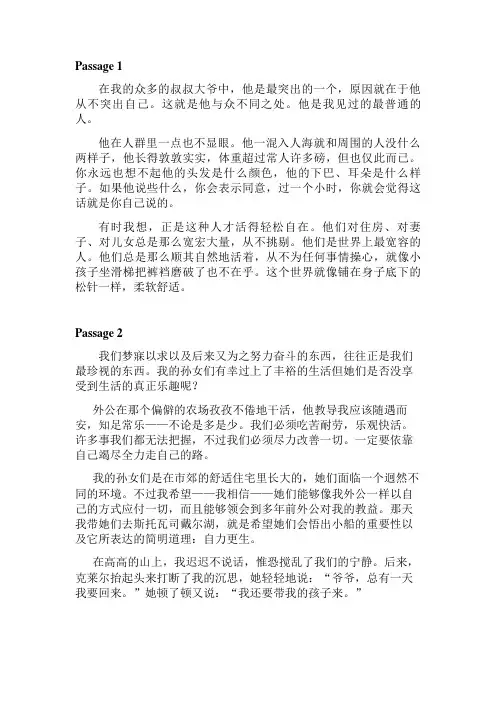
在我的众多的叔叔大爷中,他是最突出的一个,原因就在于他从不突出自己。
这就是他与众不同之处。
他是我见过的最普通的人。
他在人群里一点也不显眼。
他一混入人海就和周围的人没什么两样子,他长得敦敦实实,体重超过常人许多磅,但也仅此而已。
你永远也想不起他的头发是什么颜色,他的下巴、耳朵是什么样子。
如果他说些什么,你会表示同意,过一个小时,你就会觉得这话就是你自己说的。
有时我想,正是这种人才活得轻松自在。
他们对住房、对妻子、对儿女总是那么宽宏大量,从不挑剔。
他们是世界上最宽容的人。
他们总是那么顺其自然地活着,从不为任何事情操心,就像小孩子坐滑梯把裤裆磨破了也不在乎。
这个世界就像铺在身子底下的松针一样,柔软舒适。
Passage 2我们梦寐以求以及后来又为之努力奋斗的东西,往往正是我们最珍视的东西。
我的孙女们有幸过上了丰裕的生活但她们是否没享受到生活的真正乐趣呢?外公在那个偏僻的农场孜孜不倦地干活,他教导我应该随遇而安,知足常乐——不论是多是少。
我们必须吃苦耐劳,乐观快活。
许多事我们都无法把握,不过我们必须尽力改善一切。
一定要依靠自己竭尽全力走自己的路。
我的孙女们是在市郊的舒适住宅里长大的,她们面临一个迥然不同的环境。
不过我希望——我相信——她们能够像我外公一样以自己的方式应付一切,而且能够领会到多年前外公对我的教益。
那天我带她们去斯托瓦司戴尔湖,就是希望她们会悟出小船的重要性以及它所表达的简明道理:自力更生。
在高高的山上,我迟迟不说话,惟恐搅乱了我们的宁静。
后来,克莱尔抬起头来打断了我的沉思,她轻轻地说:“爷爷,总有一天我要回来。
”她顿了顿又说:“我还要带我的孩子来。
”皮特桑普拉斯年纪轻轻就开始打网球,也没打算在什么时候停止。
这个举止沉着、有着孩子般羞涩和一副明星面容的男人一次又一次证明了那么多球员、评论家和球迷无法否认的事实:他能够获胜,并且总是获胜。
1990年,在桑普拉斯仅有19岁的时候,他就在美国公开赛被定为第12名种子选手,他一路高奏凯歌闯入决赛,并且成为赢得这项锦标赛冠军中最年轻的一位。
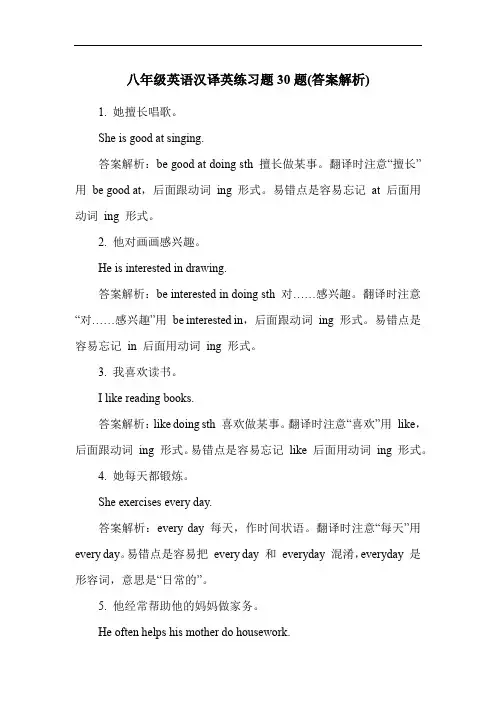
八年级英语汉译英练习题30题(答案解析)1. 她擅长唱歌。
She is good at singing.答案解析:be good at doing sth 擅长做某事。
翻译时注意“擅长”用be good at,后面跟动词ing 形式。
易错点是容易忘记at 后面用动词ing 形式。
2. 他对画画感兴趣。
He is interested in drawing.答案解析:be interested in doing sth 对……感兴趣。
翻译时注意“对……感兴趣”用be interested in,后面跟动词ing 形式。
易错点是容易忘记in 后面用动词ing 形式。
3. 我喜欢读书。
I like reading books.答案解析:like doing sth 喜欢做某事。
翻译时注意“喜欢”用like,后面跟动词ing 形式。
易错点是容易忘记like 后面用动词ing 形式。
4. 她每天都锻炼。
She exercises every day.答案解析:every day 每天,作时间状语。
翻译时注意“每天”用every day。
易错点是容易把every day 和everyday 混淆,everyday 是形容词,意思是“日常的”。
5. 他经常帮助他的妈妈做家务。
He often helps his mother do housework.答案解析:help sb do sth 帮助某人做某事。
翻译时注意“帮助某人做某事”用help sb do sth。
易错点是容易忘记help 后面的动词用原形。
6. 我每周六去购物。
I go shopping on Saturdays.答案解析:go shopping 去购物,on Saturdays 在周六。
翻译时注意“去购物”用go shopping,“在周六”用on Saturdays。
易错点是容易忘记on Saturdays 前面用介词on。
7. 她有时看电视。
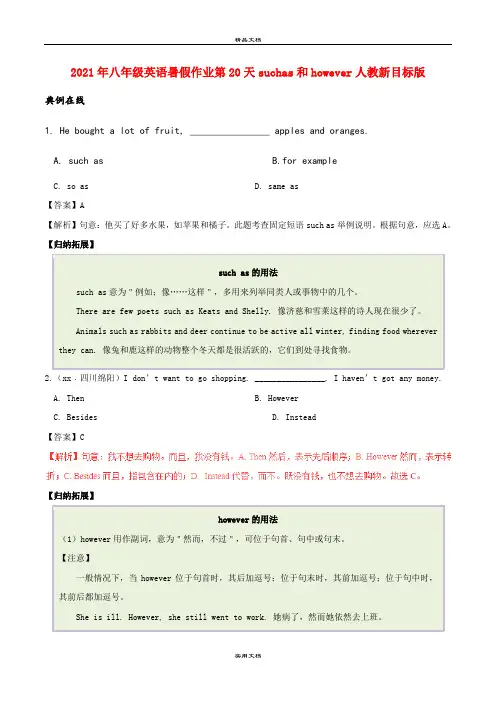
2021年八年级英语暑假作业第20天suchas和however人教新目标版典例在线1. He bought a lot of fruit, ________________ apples and oranges.A. such asB.for exampleC. so asD. same as【答案】A【解析】句意:他买了好多水果,如苹果和橘子。
此题考查固定短语such as举例说明。
根据句意,应选A。
【归纳拓展】such as的用法such as意为"例如;像……这样",多用来列举同类人或事物中的几个。
There are few poets such as Keats and Shelly. 像济慈和雪莱这样的诗人现在很少了。
Animals such as rabbits and deer continue to be active all winter, finding food wherever they can. 像兔和鹿这样的动物整个冬天都是很活跃的,它们到处寻找食物。
2.(xx﹒四川绵阳)I don’t wan t to go shopping. ________________, I haven’t got any money.A. ThenB. HoweverC. BesidesD. Instead【答案】C【归纳拓展】however的用法(1)however用作副词,意为"然而,不过",可位于句首、句中或句末。
【注意】一般情况下,当however位于句首时,其后加逗号;位于句末时,其前加逗号;位于句中时,其前后都加逗号。
She is ill. However, she still went to work. 她病了,然而她依然去上班。
试题推荐1. He has many hobbies, ______ drawing, swimming and so on.A. for exampleB. such asC. so asD. such2. I like ball games very much, ________ football, basketball and baseball.A. such asB. for exampleC. suchD. as3. Edison ________ many things in his life, _________ the light and CD.A. discovered;such asB. invented;such asC. discovered;for exampleD. invented;for example4. Beijing is famous ___________ its places of interest, ___________ the Forbidden City, theSummer Palace, and the Great wall.A. for;such asB. as;for exampleC. to;such asD. in;for example5. I can do lots of housework, _______ cleaning, washing, cooking and so on.A. for exampleB. such asC. as exampleD. as well as6. We’ve got no coffee. Let’s have tea________.A. eitherB. howeverC. yetD. instead参考答案1. B 【解析】句意:他有许多爱好,例如画画、游泳等。
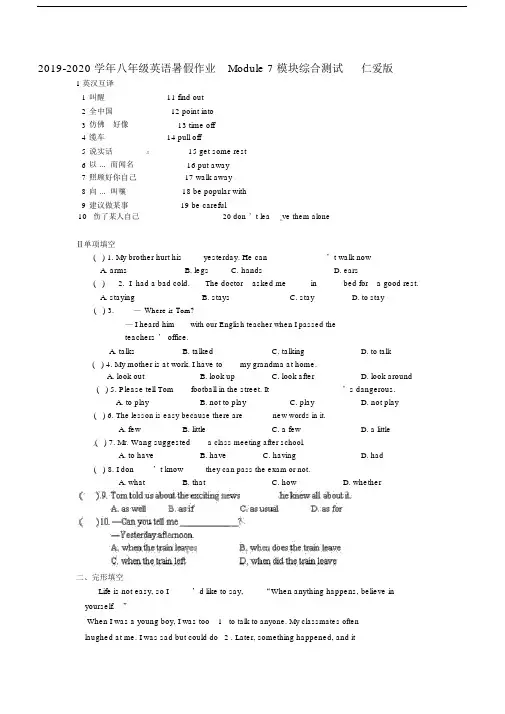
2019-2020 学年八年级英语暑假作业Module 7 模块综合测试仁爱版1英汉互译1 叫醒11 find out2 全中国12 point into3 仿佛好像13 time off4 缆车14 pull off5 说实话15 get some rest6 以 ... 而闻名16 put away7 照顾好你自己17 walk away8 向 ... 叫嚷18 be popular with9 建议做某事19 be careful10伤了某人自己20 don ’t lea ve them aloneⅡ单项填空( ) 1. My brother hurt his yesterday. He can’t walk nowA. armsB. legsC. handsD. ears( ) 2. I had a bad cold. The doctor asked me in bed for a good rest.A. stayingB. staysC. stayD. to stay( ) 3.—Where is Tom?— I heard him with our English teacher when I passed theteachers ’ office.A. talksB. talkedC. talkingD. to talk( ) 4. My mother is at work. I have to my grandma at home.A. look outB. look upC. look afterD. look around( ) 5. Please tell Tom football in the street. It’s dangerous.A. to playB. not to playC. playD. not play() 6. The lesson is easy because there are ______ new words in it.A. fewB. littleC. a fewD. a little( ) 7. Mr. Wang suggested a class meeting after school.A. to haveB. haveC. havingD. had( ) 8. I don’t know they can pass the exam or not.A. whatB. thatC. howD. whether二、完形填空Life is not easy, so I’d like to say,“When anything happens, believe in yourself.”When I was a young boy, I was too 1to talk to anyone. My classmates oftenlaughed at me. I was sad but could do 2 . Later, something happened, and itchanged my life. It was an English speech( 比赛 ) competition. My mother asked me to take part in it. What a terrible idea! It meant I had to speak 3 allthe teachers and students of my school! “Come on, boy. Believe in yourself.You are sure to 4 . ” Then mother and I talked about many different topics( 话题). At last I 5 the topic “Believe in yourself ”. I tried my best toremember all the speech and practiced it over 100 6 . With my mother ’s great love, I did 7 in the contest. I could hardly believe my 8 when the news came that I had won the first place. I heard the cheers from the teachers and students. Those classmates who once looked down on me, now all said “Congratulations! ” to me. My mother hugged ( 拥抱) me and cried 9 .Since then, everything has 10 for me. When I do anything, I try to tell myself to be sure and I will find myself. This is true not only for a person butalso for a country.( ) 1. A. shy B. sad C. excited D. happy( ) 2. A. something B. nothing C. anything D. everything ( ) 3. A. after B. with C. before D. Among( ) 4. A. win B. lose C. beat D. pass( ) 5. A. reached B. brought C. chose D. thought( ) 6. A. times B. words C. sentences D. topics三、阅读理解Have you ever been to the forest alone or with your friends during your holiday? If you go into the forest with your friends, stay with t hem. If you don’t, you may get lost. If you really get lost, this is what you should do.Sit down and stay where you are. Don’t try to find your friends — let them find you by staying in one place. There is another way to help your friends or other nearby people to find you. Give them a signal( 信号 ) by shouting or whistling( 吹口哨 ) three times. Stop. Then shout or whistle three times. Any signal given three times is acall for help.Keep up the shouting or whistling, always three times together. Whenpeople hear you, they will know that you are not just making noise for fun. They will let youknow that they have heard your signal. They will give two shouts, two whistles ortwo gun shots( 枪声 ). When someone gives such a signal, it is an answer to a callfor help.If you don ’t think that yo u will get help before night comes, try to make alittle house with branches( 树枝 ). Make yourself a soft bed with leaves and grasses.What should you do if you get hungry or need drinking water? You would have tooff leave your little br anch house to look for a river.Don’t just walk away. Pick small branches and drop them as you walk so that you can find your way back.( ) 1. If you get lost in the forest, you’d better.A. try your best to find the right way outB. walk around and try to find somebody elseC. stay in one place to wait somebody for helpD. stay in one place and give signals for help( ) 2. You keep up the shouting or whistling three times together.A. to make sure someone else could hear youB. because you can let others follow youC. to let people believe that you ne ed helpD. because it is an answer to a call for help( ) 3. If you want to help the people who lost in the forest when you,you should give two shouts, two whistles or t wo gun shots for answer.A. try to find them as soon as possibleB. hear three shouts or whistlesC. give three shouts or whistles as an answerD. shout first then whistle and shoot at last( ) 4. If you are not sure that you can get help before night comes, you shouldA. make a little house to stayB. try to find something to eatC. make a soft bed with leaves and grassD. try to find a river to get some water( ) 5. This passage mainly tells usA. what to do when you get lost in the forestB. how to make signals to others in the forestC. what you should eat while in the forestD. how to make a simple house i n the forestⅤ 补全对话A Did you see any popula r s tars?B What do you think about Beijing?C What does Jackie Chan look like?D I ’ll bring them to school tomorrowE It ’s great.F And I took some photos with them.G I went there by plane.1_______ 2 ______ 3 ________ 4 _______ 5 ________A How was you holiday, Li Jun?B ___1___ I went to Beijing with my parents.A Cool . Where did you go in Beiling?B We went to the Summer Palace, the Palace Museum, the Great Wall and so on.A _____2_____B It ’s i nteresting.I really like the Summer Palace. It has many beautiful thingsfrom differnt dynasties.A.____3______B Yes, I did. I saw Jackie Chan on the great wall.____4____A Wow, that ’s great ! can you show me the photos?B Sure.______5_____.Ⅵ 句型转换1 It took me an hour to do the housework.( 同义句 )I _________ an hour ___________ the housework. 2 Few students can answer this question. (反意疑问句)Few students can answer this questions,________ _________?3 He said to me, “Are you a teacher ? ”(间接引语)He asked me ________ _________ _________ a teacher.4 Tom said to me , “ Don’t worry about me . ”(间接引语)Tom asked me ________ ________ _________ about ________.5 I asked Zhang Lei, “ When and where were you born? ”(间接引语)I asked Zhang Lei _______________________________.6 The doctor asked his son to give all his mind to study. (直接引语)The doctor said to his sun, “_________ __________________.”Ⅶ 用适当形式完成句子1 I found a sick dog ________ (lie) on the ground.2 Don’t leave the b aby by ________ (her)3 Turn down the TV. It ’s too __ ______(noise)4 I don ’t know if he __ ______ (come) tomorrow. If he ________ (come), I _____ (phone) you at once.5 He asked me where I _________ (go) last Sunday.6 I saw a film that was _________ (call) the First Great Train Robbery.7 I often hear the girl _________ (sing) the song in the next room.8 We find it easy __________ (learn) English.9 I ’m sorry to keep you ___ ______ (wait) so long.10 Miss li is the _________ (proud) of us .Ⅷ 根据首字母完成句子1 I have two days o____ _____ this month.2 Our government asked us to p_________ our environment of all over the world.3 It ’s quiet . you can hardly hear the t__ ________ in the street.4 I often feel s_________ when I pull leaves and flowers in the park.5 The boy is too fat ,and he can ’t h___ ______ walk as fast as others.6 There is a quiet and clean p _________ through the schoolyard.7 From the tower , we can see the beautiful v________ of the lakes and the8 She asked me what was the m____ ___ , but i didn ’t tell her the t___9 As we all know that Wulingyuan scenic and historic interest area is famous forthe strange s________ of the tall rocks.10 He ate w________ his vegetables.___forests. _______.六范文背诵请以“ My pleasant trip” 为题,根据提示和要求写一次你记忆中愉快的旅行。
八年级英语汉译英练习题30题含答案解析1. 他擅长打篮球。
He is good at playing basketball.答案解析:be good at doing sth.是固定短语,表示“擅长做某事”。
翻译时注意“擅长”要用be good at,“打篮球”是play basketball,play 与球类运动搭配时中间不加冠词。
2. 她每天都做作业。
She does her homework every day.答案解析:do one's homework 是固定短语,表示“做作业”。
every day 表示“每天”,是时间状语。
翻译时注意主语是第三人称单数时,动词要用第三人称单数形式。
3. 我喜欢听音乐。
I like listening to music.答案解析:like doing sth.表示“喜欢做某事”。
listen to music 是固定短语,表示“听音乐”。
翻译时注意“听”要用listen to,不能直接用listen。
4. 他们在公园里玩。
They play in the park.答案解析:in the park 表示“在公园里”,是地点状语。
翻译时注意介词in 的用法。
5. 我的妈妈是一位老师。
My mother is a teacher.答案解析:“我的妈妈”是my mother,“一位老师”是 a teacher。
翻译时注意主语和谓语的搭配。
6. 他有一本英语书。
He has an English book.答案解析:have 表示“有”,主语是第三人称单数时,要用has。
an English book 表示“一本英语书”,翻译时注意不定冠词an 的用法。
7. 我们去上学。
We go to school.答案解析:go to school 是固定短语,表示“去上学”。
翻译时注意“上学”要用go to school,不能用go to the school。
2021年暑期八年级英语暑假作业-翻译专项练习***假期作业***一、根据所给中文补全下列句子。
1. 谁掌管这个俱乐部?Who is _______________ this club?2. 这件T恤比那件贵多了。
This T-shirt is _______________ that one.3. 赶快,否则我们上学要迟到了。
__________________, or we’ll be late for school.4. 依我看,你应该和朋友们和睦相处。
In my opinion, you should _______________ your friends. 5. 你们可以随便问我问题。
You can _____________ me questions.6. 朱迪不习惯这儿的天气。
Judy ___________ the weather here.6. 你想和同学们和睦相处吗?Do you want to ____________ your classmates?7. 刚才,他们沉默地走回了家。
They walked back home ____________ just now.8. 当你面对困难时,不要放弃。
Don’t give up when you are ______________ of difficulties. 10. 那个孩子不想交出他最喜爱的玩具。
That kid doesn’t want to _____________ his favorite toy.二、将下列句子翻译成英语。
1. 世界上最深的湖是什么?________________2. 我姐姐去过上海两次。
________________3. 昨天这个时候,我正在游泳。
________________4. 你能扫地吗?________________5. 我没去过长城。
________________6. 昨天当我的妈妈正在做晚饭时,爸爸正在看报。
初二英语英汉互译练习题1. 苹果 - apple2. 篮球 - basketball3. 猫 - cat4. 喝水 - drink water5. 电影 - movie6. 母亲 - mother7. 寒冷的冬天 - cold winter8. 餐厅 - restaurant9. 学校 - school10. 笔友 - pen pal11. 游泳 - swim12. 火车站 - train station13. 星期六 - Saturday14. 家庭作业 - homework15. 电视机 - television16. Book - 书籍17. Table - 桌子18. Bicycle - 自行车19. Schoolbag - 书包20. Teacher - 教师21. China - 中国22. Football - 足球23. Mother - 母亲24. Breakfast - 早餐25. Friend - 朋友26. Happy - 开心的27. Winter - 冬天28. Laptop - 笔记本电脑29. Guitar - 吉他30. Bedroom - 卧室以上是初二英语英汉互译练习题。
根据英文单词给出中文意思,或者根据中文意思给出对应的英文单词。
这些词汇包括日常生活用语、学校用语、运动、家庭、娱乐等方面的词汇。
通过这样的练习,可以加深对英汉互译的理解和应用能力,提高英语水平。
通过这些互译练习,我们可以学到很多单词和词组,以及它们在不同语境下的用法。
这对于英语学习者来说是非常有益的。
我们可以通过阅读、写作、口语练习等方式来巩固和运用这些词汇。
我们可以通过背单词卡片、参加英语角、使用在线词典等方式来提高自己的英汉互译能力。
此外,还可以结合课堂教学和课外阅读,加深对各种语言表达方式的理解和运用。
在日常生活中,我们也可以尝试使用英语进行沟通和交流。
可以和朋友一起练习对话,或者找一些英语母语的朋友进行交流。
2017八年级英语暑假作业第12天anyone和anywhere 人教新目标版编辑整理:尊敬的读者朋友们:这里是精品文档编辑中心,本文档内容是由我和我的同事精心编辑整理后发布的,发布之前我们对文中内容进行仔细校对,但是难免会有疏漏的地方,但是任然希望(2017八年级英语暑假作业第12天anyone和anywhere 人教新目标版)的内容能够给您的工作和学习带来便利。
同时也真诚的希望收到您的建议和反馈,这将是我们进步的源泉,前进的动力。
本文可编辑可修改,如果觉得对您有帮助请收藏以便随时查阅,最后祝您生活愉快业绩进步,以下为2017八年级英语暑假作业第12天anyone和anywhere 人教新目标版的全部内容。
第12天 anyone和anywhere典例在线1。
(2016﹒江苏泰州)—Is there ____________ else in the classroom?—It is empty. ____________ is listening to a speech in the school hall。
A。
anyone;Anyone B. anyone;EveryoneC. everyone;Anyone D。
everyone;Everyone【答案】B【易混辨析】 anyone和any oneanyone只指人,不指物,且后面不接of短语any one既可指人,又可指物,表示"任何一个",后面可接of短语。
一言辨异Anyone in my class knows any one of the singers and any one of their songs。
我们班上任何人都知道这些歌手中的任何一个和他们歌曲中的任何一首.误区警示anyone作主语时,谓语动词用单数形式。
☞ Is anyone watching the football match?有人看足球比赛吗?2。
It is a world of flowers in spring in Dongying。
八级汉英翻译练习(5篇范例)第一篇:八级汉英翻译练习八级汉英翻译练习(打印部分)1.人际关系问题我们不要太浪漫主义。
人是很有趣的,往往在接触一个人时首先看的都是他或她的优点。
这点颇像是在餐馆里用餐的经验。
开始吃头盘或冷碟的时候,印象很好。
吃头两个主菜时,也是赞不绝口。
愈吃愈趋于冷静,吃完了这顿宴席,缺点就都找出来了。
于是转喜为怒,转赞美为责备挑剔,转首肯为摇头。
这是因为,第一,开始吃的时候你正处于饥饿状态,而饿了吃糠甜加蜜,饱了吃蜜也不甜。
........2.(1)只有在我过于劳累,在我长时间无间断地工作,在我感到内心空虚,需要填补的时候,我才寂寞。
而有时在我巡回演讲后回家时,在我见了许多人,讲了许多话。
且经历多得需要清理时,我才寂寞。
(2)于是有那么小会儿感觉房子又大又空,我都不知道我的自我藏在哪儿了。
于是我会给植物浇浇水,或者将它们再挨个儿瞅瞅,好像它们是人一样。
这样我才慢慢地重新找回自我。
(3)好大一会儿,我看着水浪花从喷泉中涌出,但只有当世界在我身边逐渐消逝时,那一时刻才会到来,自我又从内心深处的无意识中冒出来,带来我最近的种种经历,让我探究,慢慢领会。
3.(`1)第二天清早,她起早出了门。
她走进批发行商业区,但是每当她走到一个商号,打算进去找工作时,她的勇气就消失了。
她心里骂自己是胆小鬼,所以她继续往前走,走了又走,最后终于走进了一家商号。
结果还是老样子。
她出来时感到命运在和她作对,因此一切努力都是徒劳的。
(2)她不知不觉中来到一个大商场,门口有成群的顾客。
这些立刻使她改变了想法。
她原先就是打算到这里来买新衣服的。
现在为了解愁,她决定进去瞧瞧。
她很想看看那些外套。
有时,一个人尽管想买东西,可是又因心里拿不定主意,所以在心里不断掂量权衡。
世界上再没有比这种中间状态更令人愉悦了。
4.深圳大学学术交流中心是深圳大学唯一的一所涉外宾馆。
中心建筑风格独特,安静而且安全。
拥有各种普通、标准、豪华客房140余间,可同时接纳350多名客人入住。
He stood out splendidly above all my uncles because he did not stand out at all. That was his distinction. He was the average man I everknew.You would never pick him out in a crowd. He became just another man the minute he was in one. So many more pounds of man. Good solid pounds, but just pounds. You would never remember his hair or his chin,or the shape of his ears. If he said something, you would agree with it, and, an hour later, you would be sure you had said it yourself.Sometimes I think men like that get along about the best. They arethe easiest on their houses, their wives, and their children. They are easiest on the world. They slide along without having to do anythingabout it as small boys do on their breeches after they have slid on them enough to wear them down smooth. The world is all so much pineneedles under them.Passage 2Usually the things we dream of, then work and struggle for, are what we value most. Have my granddaughters, blessed with abundance, beendenied life’s real pleasures?Working tirelessly on that isolated farm, my grandfather taught me that we should accept and be grateful for what we have –whether it bemuch or little. We must bear the burdens and relish the joys. There is so much we cannot control, but we must try to make things better when we are able. We must depend upon ourselves to make our own way as best aswe can.Growing up in a comfortable suburban home, my granddaughters have been presented with a different situation. But I hope –I believe –theywill in their own way be able to cope with as well as my grandfather coped, and learn the lesson my grandfather taught me all those years ago.On the day I took them to Storvassdal, I hope they would somehow understand the importance of the little boat and its simple message ofself-reliance.High in the mountain, I hesitated to speak lest I disturb ourtranquility. Then Claire looked up and broke my reverie as she said softly, ―Grandpa, someday I’ll come back.‖She paused. ―And I’ll bring mychildren.‖Pete Sampras started playing tennis young and makes no plans to stop anytime soon. The man who has a calm demeanor, boyish shyness and the looks of a star proves again and again what so many players, critics and fans can’t deny: he can win, and always does. In 1990, when Sampras was only 19 years old and seeded twelfth in the U.S. Open, he slammed his way into the finals and became the youngest man to win the tournament. And we all knew after that first Grand Slam victory there would be no looking back.Over the years, the quiet giant has gone on to win eleven more Grand Slams: six Wimbledons, three more U.S. Opens, and two Australian Opens. Sampras’s most beloved titles have come on the grasses of the All England Lawn Tennis and Croquet Club. In 1993, he won his first Wimbledon title, and since that year, has gotten to and won in every final, except for a quarterfinal defeat by in 1996. He is the winningest man at Wimbledon in the Open Era and is one championship away from tying the all time record of seven titles that was set in the late 1800s. The historic grounds of Wimbledon and the intimate Center Court has become a home for Sampras, a ―cathedra‖ as he once said. He will undoubtedly go down in the history books as the greatest.Passage 4The ocean covers three quarters of the earth’s surface, produces 90 percent of all its life-supporting oxygen, and is the driving force behind the entire weather system. There are over 450 million cubic miles of sea water on the earth; and each cubic mile contains over 150 million tons of minerals.So vast and so pervasive is the sea that if the earth’s crust were made level, ocean water would form a blanket over 8,000 feet deep.The oceans contribute immeasurably to the earth’s life support system as well as provide an untapped storehouse of food, minerals, energy, and archaeological treasure.Advanced atmospheric diving suits permit researchers to descend to depths of 1,500 feet. Yet the ocean’s average depth is greater than 12,000 feet. It is at these depths that remarkable discoveries are being made, discoveries which only a short time ago would have been impossible.In that depth, where darkness is absolute and pressure exceeds eight tons per square inch, robotic submersibles have discovered enormous gorges, four times deeper than the Grand Canyon. Here, too, are volcanoes that vastly outnumber those on land. Landslides the size of Rhode Island have been recorded, as well as raging undersea storms that go completely unnoticed on the surface while dramatically rearranging the underwater landscapes.Passage 5It is a curious fact that nine people out of ten become happier when faced with some small misfortune. On my first visit to America, thirty-five years ago, a train in which I was travelling became stuck in a snowdrift so that we did not arrive in New York until a great many hours after all the food on the train had been eaten up. I was beginning to expect that the passengers would draw lots as to who should be eaten, but, far from that, everybody was in the best spirits. People who would have hated each other in ordinary circumstances found each other quite agreeable, and everybody reached an obviously exceptional level of happiness.I observed the same thing in a really bad London fog. An ordinary fog is a mere nuisance, but a fog so bad that you cannot see your own feet brings consolation even to the most melancholic. People begin to speak to complete strangers –a thing which in London is not much done. They recall the far worse fogs that they remember in their youth; they tell of friends who got lost at Hyde Park Corner and were only found again by accidentally running into a policeman in quite another part of the town. Everybody laughs, everybody is jolly –until the fog clears, when they again become sober, grave and responsible citizens.Unfortunately, this mood, which is appropriate enough for small mishaps that cannot be prevented, is apt to extend itself to large misfortunes that could have been avoided.Passage 6What was the origin of the oil which now drives our motor-cars and aircraft? Scientists are confident about the formation of coal, but they do not seem so sure when asked about oil. They think that the oil under the surface of the earth originated in the distant past, and was formed from living things in the sea. Countless billions of minute sea creatures andplants lived and sank to the sea bed. They were covered with huge deposits of mud, and by processes of chemistry, pressure and temperature were changed through long ages into what we know as oil. For these creatures to become oil, it was necessary that they should be imprisoned between layers of rock for an enormous length of time. The statement that oil originated in the sea is confirmed by a glance at a map showing the chief oilfields of the world; very few of them are far distant from the oceans of today. In some places gas and oil come up to the surface of the sea from its bed. The rocks in which oil is found are of marine origin too. They are sedimentary rocks, rocks which were laid down by the action of water on the bed of the ocean. Almost always the remains of shells, and other proofs of sea life, are found close to the oil. A very common sedimentary rock is called shale, which is a soft rock and was obviously formed by being deposited on the sea bed. And where there is shale there is likely to be oil.Passage 7For me the most interesting thing about a solitary life, and mine has been that for the last twenty years, is that it becomes increasingly rewarding. When I can wake up and watch the sun rise over the ocean, as I do most days, and know that I have an entire day ahead, uninterrupted, in which to write a few pages, take a walk with my dogs, read and listen to music, I am flooded with happiness.I am lonely only when I am overtired, when I have worked too long without a break, when for the time being I feel empty and need filling up. And I am lonely sometimes when I come back home after a lecture trip, when I have seen a lot of people and talked a lot, and am full to the brim with experience that needs to be sorted out.Then for a little while the house feels huge and empty, and I wonder where my self is hiding. It has to be recaptured slowly by watching the plants and, perhaps, by looking again at each one as though it were a person.It takes a while, as I watch the surf blowing up in fountains, but the moment comes when the world falls away, and the self emerges again from the deep unconsciousness, bring back all I have recently experienced to be explored and slowly understood.Passage 8Making a long trip to the supermarket and queuing for hours used to be the normal weekly routine for British and American shoppers. But since the 1990s, there is a better way to get your groceries. Supermarket shopping on the Internet has boomed in the UK and the USA.The major supermarkets have their own websites, and if you order on-line with them, for a small extra sum such as $8 / £5 the supermarkets will do your shopping for you and deliver it to your door. If you shop with them regularly, they will ―remember‖your favorites items so you can order them next time without searching for them!These days thousands of people in the UK and the States regularly do their supermarket shopping in this way. In contrast, in many rural areas of Britain there has been a return to the traditional outdoor market. Farmers’markets, where farmers sell their products directly to the customers, had practically died out in Britain because of the attraction of the supermarkets, but they have been resurrected recently, both to help farmers make more profits, and to provide customers with ―real‖food again, such as fresh meat, eggs, vegetables and preserves. Organic food has become very popular, and some producers run a ―box service‖, where they deliver a weekly box of fruit and vegetables to your door. Customers can’t select the food—they just receive whatever is in season—but it is guaranteed to be fresh and free from chemicals, and now you can often order these on-line too!。